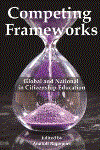
Competing Frameworks
Global and National in Citizenship Education
Edited by:
Anatoli Rapoport, Purdue University
Published 2018
For citizenship education in the 21st century, globalization increasingly presents a new challenge and a new opportunity. Since the time when nationalism played a critical role in unifying new nations, nationality and citizenship have been virtually synonymous terms. As a result, the constructed symbiosis of citizenship and national identity has influenced state supported citizenship education in the most profound way. School curricula, particularly in public schools, produced and reinforced the dominant version of citizenship, which is national citizenship. Schools were expected to prepare future loyal citizens who would identify themselves with the nation.
Due to the changing nature and scope of human interactions, the traditional model of citizenship education, however, appears increasingly outdated and deficient to address many contemporary challenges. Thus, schools have become a locus of a potential conflict of two citizenship discourses: the discourse of national citizenship that for a long time has served as the ultimate purpose of public education and the discourse of global citizenship that is forcefully and continuously seeking for a proper place in school curricula despite the lack of curricular heritage. The need for an education for citizenship that has a global scope and is guided by critical and emancipatory approaches becomes more evident. At the same time, the pressure to globalize and internationalize curriculum actively challenges such concepts as patriotism, national identity, loyalty to the state, or national uniqueness of government and democratic development that have been fundamental for citizenship and civic education for decades.
In this book, a group of international scholars present their research about the dynamic development, interplay, and interconnectedness of two major discourses in citizenship education, namely national and global. Case studies and ethnographies from China, Cyprus, Egypt, Hong Kong and Singapore, Lebanon, Liberia, the Netherlands, Russia, and the United States display a multifaceted but yet comprehensive picture of educators’ attempts to promote social justice, global awareness, and multiple loyalties. The volume will appeal to several constituencies: it will be interesting to teachers and teacher educators whose focus of instruction is citizenship education, social studies education, and global education; it will also be interesting to scholars who conduct research in citizenship and global education.
CONTENTS
Introduction: National and Global in Citizenship Education, Anatoli Rapoport. U.S. Youth’s Sense of Belonging as Citizens of Their Communities: Probing Youth’s Nonbelonging to a National Community, Jasmina Josić. A Comparative Case Study of International Schools in Singapore and Hong Kong: Studying Global Issues as Ethical/Political Practice, Mark Baildon, Theresa Alviar-Martin, Sandra Bott, and Marie Lam. Rethinking Cosmopolitanism and Global Citizenship Within Multimodal Digital Literacy Education, Jason Harshman and Agie Behounek. The Struggle for National Identity: Islam in Egypt, the Netherlands, and the United States, Mohamed Amira and Frans H. Doppen. Collapsing the Supranational and the National: From Citizenship to Health Education in the Republic of Cyprus, Stavroula Philippou and Eleni Theodorou. Teachers, Twitter, and Global Citizenship Education: Global Discussions, National Boundaries, Laura Quaynor and Elizabeth Sturm. Flipping the Panopticon: Liberian Youth Break the Fourth Wall in the Ebola Crisis, Jasmine L. Blanks Jones. Measuring Outcomes of Citizen Education: Values and Identity of the Russian Youth, Anna Sanina. Coping With the Challenge of Globalization at Home and Abroad: China’s Patriotic Education, Xiauye Qin. Global Citizenship Versus Patriotism: The Correlation Between Turkish Preservice Teachers’ Perception of Patriotism and Global Citizenship, Emin Kilinc and Bülent Tarman. About the Authors.
-
Paperback9781641134477
Web price: $45.04 (Reg. 52.99)
-
Hardcover9781641134484
Web price: $80.74 (Reg. 94.99)
- eBook9781641134491

- EDU029040 - EDUCATION: TEACHING METHODS & MATERIALS: Social Science
- EDU007000 - EDUCATION: Curricula
- POL003000 - POLITICAL SCIENCE: Civics & Citizenship
-
 (Re)Envisioning Social Studies Education Research
Current Epistemological and Methodological Expansions, Deconstructions, and Creations
(Re)Envisioning Social Studies Education Research
Current Epistemological and Methodological Expansions, Deconstructions, and Creations
-
 Beyond Single Stories
Changing Narratives for a Changing World
Beyond Single Stories
Changing Narratives for a Changing World
-
 Frameworks for Integrated Project-Based Instruction in STEM Disciplines
Frameworks for Integrated Project-Based Instruction in STEM Disciplines
-
 Healing While Studying
Reflections and Strategies for Healing, Coping, and Liberation of Graduate Students of Minoritized Identities
Healing While Studying
Reflections and Strategies for Healing, Coping, and Liberation of Graduate Students of Minoritized Identities
-
 Reflections on People, Policy, and Practices in Curriculum History
Reflections on People, Policy, and Practices in Curriculum History
-
 Teaching Peace Through Popular Culture
2nd Edition
Teaching Peace Through Popular Culture
2nd Edition
-
 The Fear Problematique
Role of Philosophy of Education in Speaking Truths to Powers in a Culture of Fear
The Fear Problematique
Role of Philosophy of Education in Speaking Truths to Powers in a Culture of Fear

